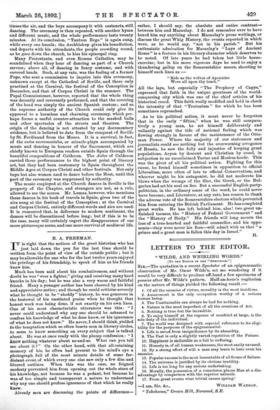E. A. FREEMAN.
TT is right that the notices of the great historian who has
just laid down the pen for the last time should be written from the point of view of the outside public ; but it may be allowable for one who for the last twelve years enjoyed the privilege of his friendship, to speak of him as his friends 'knew him.
Much has been said about his combativeness, and without 'doubt he was "ever a fighter," giving and receiving many hard .knocks in his day ; but he was also a very warm and faithful friend. Many a younger author has been cheered by his kind and appreciative notice; and though be could criticise severely what he thought to be " shoddy " history, he was generous in -the bestowal of his unstinted praise when he thought that honest work was being done, if not exactly on his own lines. One of his most characteristic utterances was this : "I never could understand why any one should be ashamed to confess his knowledge of what he does know, or his ignorance of what he does not know." He never, I should think, yielded to the temptation which so often besets men in literary circles, to seem to know something on every subject that is talked about. He was at once ready with the plump confession : "I know nothing whatever about so-and-so. What can you tell me about it ?" On the other hand, with that all-retaining memory of his, he often had present to his mind's eye a photograph full of the most minute details of some far- distant event of which every one else saw only a few dim and blurred outlines. When this was the case, no feigned modesty prevented him from opening out the whole store of his knowledge, not because he was a pedant, but because he was of too simple and transparent a nature to understand why any one should profess ignorance of that which he really knew.
Already men are discussing the points of difference—
rather, I should say, the absolute and entire contrast— between him and Macaulay. I do not remember ever to have heard him say anything about Macaulay's prose writings, or discuss the great Whig History, the events reported in which were, as he would say, "not in his parish." But his enthusiatic admiration for Macaulay's "Lays of Ancient Rome" is a feature in his literary character which deserves to be noted. Of late years he had taken but little horse- exercise ; but in his more vigorous days he used to enjoy a thundering gallop on the Somersetshire moors, shouting to himself such lines as :—
" Ride as the wolves of Apennine Were all upon thy track."
All the lays, but especially "The Prophecy of Capys," expressed that faith in the unique greatness of the world- conquering city which was one of the chief articles of his historical creed. This faith really modified and held in check the intensity of that " Teutonism " for which he has been sometimes reproached.
As to his political action, it must never be forgotten that in the early "fifties," when he was still compara- tively a young man, he set himself deliberately and valiantly against the tide of national feeling which was flowing strongly in favour of the maintenance of the Otto- man Power. Where the majority of our statesmen and journalists could see nothing but the overweening arrogance of Russia, he saw the folly and injustice of keeping great populations, Aryan by descent and Christian by creed, in subjection to an unreclaimed Tartar and Moslem horde. This was the pivot of all his political action. Fighting for this cause, he found himself sometimes in opposition to official Liberalism, more often of late to official Conservatism, and whoever might be his antagonist, he did not moderate his blows when the wrongs of the Slav, the Greek, or the Bul- garian had set his soul on fire. But a successful English party- politician, in the ordinary sense of the word, he could never have become; and Literature, at any rate, has reason to thank the adverse vote of the Somersetshire electors which prevented him from entering the British Parliament. He has completed great works. He has left behind him, alas ! two great un- finished torsoes, the "History of Federal Government" and the "History of Sicily." His friends will long mourn the loss of a true-hearted and faithful counsellor, and his oppo- nents—they were never his foes—will admit with us that "a prince and a great man is fallen this day in Israel." H.


































 Previous page
Previous page